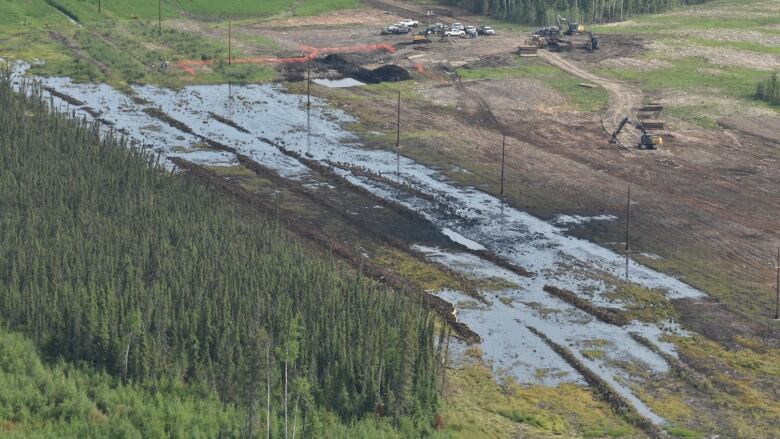Nexen spill: New pipelines not always safer, investigator says
Many factors can render safety measures ineffective, according to industry veteran

As the search for what caused a massive pipeline leak in northern Alberta continues, one U.S. oil spill investigator is warning that new pipelines are not always the safest.
Last week, a contractor discovered a leak in a Nexen Energy petroleum pipeline that spilled fivemillion litres of emulsion a mix of bitumen, sand and water outside Fort McMurray, Alta.
The cause of the spill, one of the biggest ever in Alberta,is not yet known. The double-layer pipeline only started operating last year and was equipped with a leak detection system that should have alerted the company to the problem, but didn't.
Don't oversell the technology. Don't writechequesyou really can't cash.- RickKuprewicz, president ofAccufacts
Veteran pipeline investigator Rick Kuprewiczsaidcompanies and the public sometimes put too much stock in how new safety features mightprevent spills.
The presidentof Washington state-based AccufactsInc.,Kuprewicz said newer pipelines are not always safer.
"I've seen 40- or 50-year-old pipelines that are in better shape than pipelines that are one or two years old, " he said.
"New in itself doesn't necessarily mean better. Nor is old necessarily bad."
His company is not involved in the investigation of the Nexen spill and has not worked directly with this particular pipeline. Butit has spent decades investigating oil spills for companies and governments in Canada and the U.S..
Kuprewicz said there is not yetenough information availableto be sure of muchthat occurred withthe Nexen spill. Butnew technology sometimes gives an inflated sense of safety, he suggested, and leak detection systems can be helpful and inspire confidence, but they are not always reliable.
"Don't oversell the technology. Don't write cheques you really can't cash," he said.
"Don't create in the mind of the public that you have a system that will work in all situations. Don't be afraid to say, 'There are some limitations in this.'"
He noted technology, like the kind ofdouble-walled pipeline involved in the Nexen spill,might not provide as much safety protection as some think.The basic concept that sellsthose type of pipelines isthat if the inner wall of the pipeline breaks, the outer wall will act as a backstop forspills.
But how well it works depends on everything from the type of thematerialto the installation andhow the pipeline operates. For instance, if the double-walledpipeline ismade of steel, under certain conditionsrisk of a rupture can increase because erosion can occur,Kuprewicz said
"It may be the illusion of safety when it really isn't," he said.
"In some cases, the operators are doing the right things and it is safer. In other cases, they think they are doing the right things and it isn't safer."
Don't apologize, don't hide
Pipeline failures can create a "credibility gap" with the public, Kuprewiczacknowledged. If people are assured that new technology or better methods make the pipeline safe, they are that much more distrustful if a leak does occur.
Once a leak does happen, the actions of the company have a big impact on the public's trust. Ron Bailey, Nexen's senior vice-president of Canadian operations,publicly apologized on behalf of the company for the spilllast week.
"We sincerely apologize for the impact this hascaused," he said Friday.
But Kuprewicz argues that approachcan actually make the situation worse.
"The last thing I want to hear is, 'Aw, well, we made a mistake and we learned our lesson,' " he said.
"In Canada and the U.S., the pipeline operator is already supposed to know this stuff. You're not supposed to have these failures."
- Nexenapologizes for northern Alberta pipeline break
- Nexenpipeline leak in Alberta spills 5 million litres
- Alberta pipelines: 6 major oil spills in recent history
Instead, he urged pipeline companies to be forthcoming with information, and showhonesty about what caused the spill and how clean-up efforts are going.
He noted there have been recent cases in the U.S. where companies have tried to cover up the damage that spills have caused. That is likely to erode public trust,he said.
"It's a fine line between trying to tell the truth based on what you know today, or trying to hide the facts. If you get caught trying to hide the facts, your credibility is hard to establish," he said.
Credibility problems caused by spills and clean-ups can have a big impact on how willing people are to support other pipeline projects, he said.












_(720p).jpg)


 OFFICIAL HD MUSIC VIDEO.jpg)
.jpg)



























































































